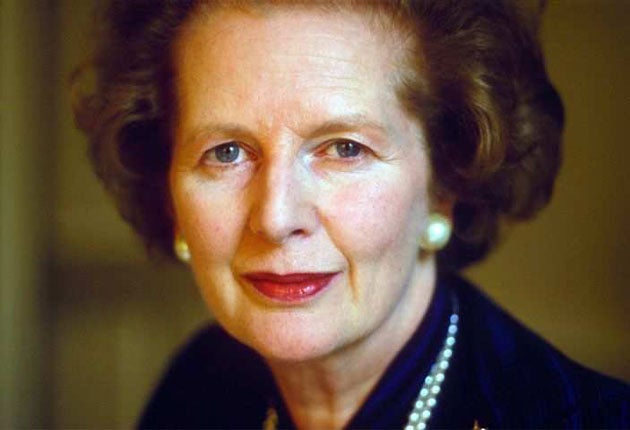I wonder what the ghost of Margaret Thatcher would make of her successor’s new cabinet?
Thatcher would surely approve, particularly as the values shared by the vast majority of Johnson’s cabinet now are unashamedly Thatcherite, free market – and Brexity


Your support helps us to tell the story
From reproductive rights to climate change to Big Tech, The Independent is on the ground when the story is developing. Whether it's investigating the financials of Elon Musk's pro-Trump PAC or producing our latest documentary, 'The A Word', which shines a light on the American women fighting for reproductive rights, we know how important it is to parse out the facts from the messaging.
At such a critical moment in US history, we need reporters on the ground. Your donation allows us to keep sending journalists to speak to both sides of the story.
The Independent is trusted by Americans across the entire political spectrum. And unlike many other quality news outlets, we choose not to lock Americans out of our reporting and analysis with paywalls. We believe quality journalism should be available to everyone, paid for by those who can afford it.
Your support makes all the difference.I wonder what the ghost of Margaret Thatcher would have made of her successor’s new cabinet? In her 11 years as prime minister, she only ever appointed one other woman to the top table.
It was more than a decade after she left office that the first black member of the cabinet was appointed under a Labour government, and not until David Cameron’s coalition of 2010 that Sayeeda Warsi became the first Asian parliamentarian to hold a full cabinet post.
By contrast, Boris Johnson now has eight women and seven ethnic minority cabinet members. Admittedly, it’s a long way from gender parity – indeed, there are two fewer women attending cabinet than there were under the last Labour PM, Gordon Brown. But if Thatcher were to find herself spirited back into No 10, she would find her party in government transformed.
Johnson’s ministers are far more diverse, not just in appearance but in background. A daughter of a bus driver (Nadine Dorries) now joins a son of a bus driver (Sajid Javid). A former child refugee (Nadhim Zahawi) will rub shoulders with a man who started life in care (Michael Gove). The Conservatives have always embraced aspiration as the route out of adversity. These cabinet ministers are living the British version of the American dream.
Thatcher would surely approve, particularly as the values shared by the vast majority of Johnson’s cabinet now are unashamedly Thatcherite, free market – and Brexity. No wonder those promoted are popular with the Tory grassroots.
So what does all this mean for the direction of the government, and indeed the country?
Here opinion differs. On the one hand, some argue that now he’s kept the base happy (and it’s been noted that the four cabinet ministers either sacked or demoted were the least popular with Tory members, according to a Conservative Home poll), Johnson has the freedom to manoeuvre his own pet policies onto the statute book.
According to this theory, he can now tax and spend more, with greater impunity.
But perhaps he’s appointed in his own image. Maybe he’s not a “Brexity Hezza”, as he once described himself. Less a one nation Tory in the mould of the former deputy prime minister Lord Heseltine, and more the true heir to Thatcher. Where she snatched milk from school children, he’s caused consternation among a new generation of Tory “wets” by whisking away the £20-a-week universal credit uplift.
The truth is, to understand the significance of yesterday’s reshuffle, we really need to work out who Johnson really is. Two years after becoming prime minister, he remains a mass of contradictions.
The former London mayor who once proposed an amnesty for illegal immigrants has been accused of xenophobia with his columns comparing Muslim women wearing the burka to letter boxes.
He famously declared “f*** business” but boasted he’d relentlessly “stuck up for the bankers”. The man who said he wanted the Conservatives to be “warriors of the dispossessed” has also claimed that the children of single mothers were “ill-raised, ignorant, aggressive and illegitimate”. He’s in the past joked about “tank-topped bumboys”, yet he attended Pride wearing a pink Stetson.
Will we look back on this week as the moment the true Johnson emerged from the bluff and bluster of off-the-cuff remarks and revealing asides? After all, while Dominic Cummings pulled the strings in Johnson’s last reshuffle, this one was the prime minister’s own work.
His friends say Johnsonism is all about levelling up. In an interview with the journalist Rachel Sylvester, he once said his party should be “the champions of the poor and the liberators of the disadvantaged. We should be the human battering rams breaking down doors for people who need someone to help them.”
Having pulled the UK out of the European Union, Johnson’s allies insist he’s now intent on leading a post-pandemic renaissance, remaking Britain, just as Thatcher did before him. His detractors refuse to believe it.
Former Labour mayor of London Ken Livingstone once described his Tory opponent as “the most hardline right-wing ideologue since Thatcher”. He later concluded he was simply “a fairly lazy tosser who just wants to be there”.
Ideologue or opportunist? It’s time for him – and us – to find out.
Cathy Newman presents ‘Channel 4 News’, weekdays, at 7pm
Join our commenting forum
Join thought-provoking conversations, follow other Independent readers and see their replies
Comments